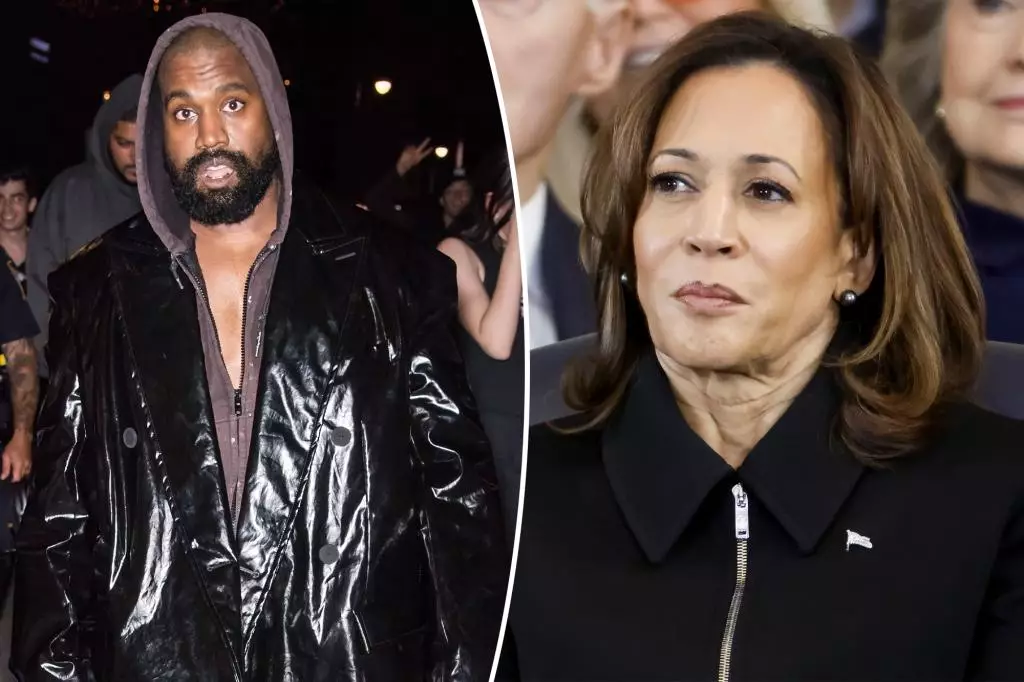The realm of social media has increasingly become a breeding ground for public figures to express their thoughts, often without the mediation of traditional journalistic standards. Recently, Kanye West found himself in the headlines after posting a controversial tweet referencing former Vice President Kamala Harris in a sexualized manner. While the tweet has since been deleted, the incident exposes several underlying themes concerning celebrity culture, accountability, and the evolving nature of public discourse.
Kanye West, a polarizing figure in contemporary music and culture, leveraged his social media platform to express personal opinions that veer towards the provocative. His tweet, which crudely suggested a past romantic interest in Harris, raises important questions about the responsibilities that come with celebrity status. With millions of followers, West wields significant influence; his words can easily shape perceptions and trigger social reactions. The very nature of his tweet reveals a disregard for the implication of his remarks, particularly when directed at a politician, who, despite personal feelings, is also a figure of public service and policy discourse.
The response to West’s tweet indicates a broader societal concern regarding celebrity actions and their impact on public dialogue. As the lines between personal viewpoints and public discourse blur, there is a growing demand for accountability from those in positions of influence. Will celebrities like West recognize the ripple effects of their comments, especially when they disparage public figures, or will they continue to operate within a bubble of privilege untouched by the consequences of their words?
The backlash against West’s messages was quick and severe, reflecting the heightened sensitivity surrounding discussions of sexualization and respect within political contexts. His admission that “democrats” made him take down the tweet—whether true or a jest—further complicates the narrative by introducing underlying political loyalty to the discourse. This reminds us that social media is not just a platform for self-expression but also a battleground for political allegiance, personal identity, and community belonging.
Moreover, the follow-up comments where West boasted about his wealth and success signify a troubling trend in celebrity culture—namely, the notion that financial success equates to a license for irresponsible or reckless discourse. As he declared that he could “say whatever the f***” he wanted, one begins to wonder about the ethical responsibilities of public figures. Shouldn’t the expectation be that with platforms of such reach come a duty to promote respectful and constructive dialogue, rather than glorifying divisive or crude remarks?
The history between Kanye West and Taylor Swift offers an intriguing lens through which to examine these dynamics. Their contentious interactions, beginning with the infamous VMA incident in 2009, illustrates how celebrity disputes can captivate public attention and dominate media narratives. West’s recent mention of Swift in a context seemingly meant for comic relief only serves to remind audiences of the ongoing tension and the cyclical nature of their relationship.
Swift, having evolved her own narrative through artistic expression, addresses her experiences with public perception through her music. On the other hand, West’s approach leans towards unapologetic braggadocio, often invoking humor at the expense of others—a strategy that occasionally leads to criticism rather than admiration. This contrast highlights not only divergent personal brands but also a broader critique of how public disagreements are managed amidst an environment craving authenticity and sincerity.
As we analyze incidents such as West’s tweet about Kamala Harris, it is vital to consider the ramifications of such public displays. In a cultural climate where line-crossing behavior can rapidly gain traction and provoke polarized opinions, there is a pressing need for a collective reassessment of what constitutes responsible speech. Simply put, should we not expect more from those who shape our culture?
Ultimately, West’s recent activities bring to the forefront an urgent discussion about celebrity culture, accountability, and ethics in public discourse. As social media continues to evolve, so too must our expectations for those who utilize it. The onus lies not only with the celebrities to reflect on their impact but also with society to demand better dialogue, aiming for a space that allows for constructive exchanges instead of divisive commentary. The world is indeed watching, and where the narrative goes from here remains to be seen.

